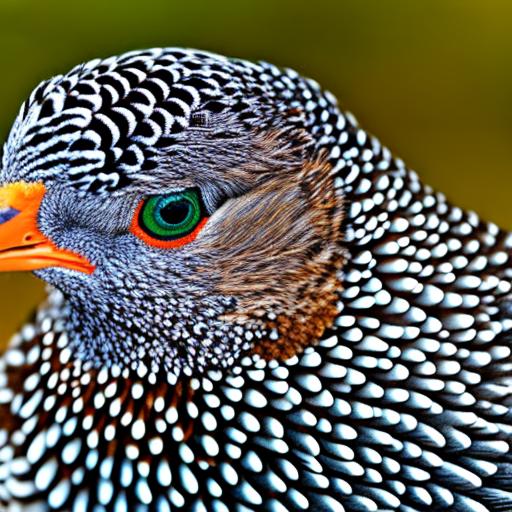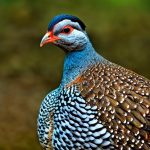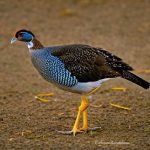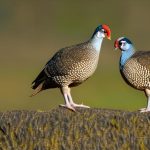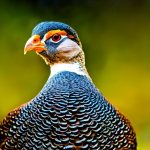Guinea fowl, also known as pintades, are a unique and fascinating bird species that have been domesticated for thousands of years. They are native to the African continent and have been kept by humans for their meat, eggs, and pest control abilities. Guinea fowl are known for their distinctive appearance, with speckled feathers and a helmet-like bony structure on their heads. They are also known for their loud and distinctive calls, which can be heard from a distance. Guinea fowl are social birds that prefer to live in flocks, and they are highly adaptable to different environments, making them a popular choice for small-scale poultry farming and as pets.
Guinea fowl are known for their excellent foraging abilities and are often kept for pest control in agricultural settings. They are voracious eaters of insects, ticks, and other pests, making them a valuable asset in controlling pest populations in gardens and farms. In addition to their pest control abilities, guinea fowl are also valued for their flavorful meat and nutritious eggs. They are considered a delicacy in many parts of the world and are often raised for their culinary value. Guinea fowl are also known for their alert and watchful nature, making them effective alarm systems against potential predators. Overall, guinea fowl are a versatile and valuable addition to any small farm or homestead.
Key Takeaways
- Guinea fowl are unique and interesting birds that make great pets for those with the space and resources to care for them.
- Guinea fowl are known for their loud calls, social behavior, and ability to act as natural pest control.
- When considering keeping guinea fowl as pets, it’s important to consider their space and social needs, as well as their ability to roam and forage.
- Guinea fowl require a secure and spacious enclosure to protect them from predators and the elements.
- A balanced diet of grains, seeds, insects, and greens is essential for the health and well-being of guinea fowl. Regular veterinary care is also important for keeping them healthy.
Characteristics and Behavior of Guinea Fowl
Guinea fowl are known for their unique characteristics and behaviors that set them apart from other poultry species. They are highly social birds that prefer to live in flocks, and they have a strong pecking order within their groups. Guinea fowl are also known for their loud and distinctive calls, which can be heard from a distance. These calls serve as a form of communication within the flock and can alert other members to potential dangers or sources of food. Guinea fowl are also highly alert and watchful birds, making them effective alarm systems against potential predators. They have a keen sense of sight and hearing, allowing them to detect threats from a distance and alert the rest of the flock.
In addition to their social nature, guinea fowl are also known for their excellent foraging abilities. They are voracious eaters of insects, ticks, and other pests, making them valuable assets in controlling pest populations in gardens and farms. Guinea fowl are also known for their adaptability to different environments, making them well-suited for a variety of climates and living conditions. They are hardy birds that can withstand harsh weather conditions and are relatively low-maintenance compared to other poultry species. Overall, guinea fowl are unique and fascinating birds with a range of characteristics and behaviors that make them a valuable addition to any small farm or homestead.
Considerations for Keeping Guinea Fowl as Pets
Keeping guinea fowl as pets can be a rewarding experience, but it is important to consider a few key factors before bringing them into your home. First and foremost, it is important to consider the space requirements for guinea fowl, as they are highly active birds that require ample room to roam and forage. A spacious outdoor enclosure is essential for keeping guinea fowl happy and healthy, as they thrive in environments where they can exhibit natural behaviors such as dust bathing and foraging for food. Additionally, it is important to consider the noise level of guinea fowl, as they are known for their loud calls that can be disruptive in residential areas. It is important to consider the impact of their calls on neighbors and to provide adequate space and enrichment to minimize excessive vocalization.
Another important consideration for keeping guinea fowl as pets is their social nature and need for companionship. Guinea fowl thrive in flocks and can become stressed or anxious when kept alone. It is important to consider the number of guinea fowl you plan to keep and to provide them with adequate social interaction to prevent loneliness and behavioral issues. Additionally, it is important to consider the predator-proofing of their enclosure, as guinea fowl are vulnerable to predation from a variety of animals including dogs, foxes, and birds of prey. Providing a secure enclosure with proper fencing and predator deterrents is essential for keeping guinea fowl safe and secure. Overall, keeping guinea fowl as pets requires careful consideration of their space requirements, noise level, social needs, and predator-proofing to ensure a positive and enriching experience for both the birds and their owners.
Housing and Enclosure Requirements for Guinea Fowl
When it comes to housing and enclosure requirements for guinea fowl, there are several key factors to consider to ensure the health and well-being of these unique birds. First and foremost, it is important to provide a spacious outdoor enclosure that allows guinea fowl to exhibit natural behaviors such as dust bathing, foraging for food, and roosting. A minimum of 3-4 square feet per bird is recommended to provide adequate space for exercise and social interaction within the flock. The enclosure should also be predator-proofed with secure fencing and predator deterrents to protect guinea fowl from potential threats such as dogs, foxes, and birds of prey.
In addition to outdoor enclosures, it is important to provide sheltered areas such as coops or shelters where guinea fowl can roost at night and seek refuge from inclement weather. Coops should be well-ventilated and provide adequate roosting space for all members of the flock. Nesting boxes should also be provided for hens to lay eggs in a safe and secure environment. It is important to keep the coop clean and free from drafts, moisture, and pests to prevent health issues such as respiratory infections or parasites. Overall, providing a spacious outdoor enclosure with secure fencing, predator-proofing measures, sheltered areas, and clean coops is essential for meeting the housing and enclosure requirements of guinea fowl.
Diet and Nutrition for Guinea Fowl
Proper diet and nutrition are essential for the health and well-being of guinea fowl. Guinea fowl are omnivorous birds that require a balanced diet consisting of high-quality poultry feed, fresh water, and access to natural forage. A commercial poultry feed formulated specifically for guinea fowl should be provided as the main source of nutrition, as it contains essential vitamins, minerals, and protein necessary for their growth and development. It is important to choose a feed that is appropriate for the age and life stage of the birds, whether they are chicks, juveniles, or adults.
In addition to poultry feed, guinea fowl should have access to fresh water at all times to prevent dehydration and maintain proper hydration. Waterers should be kept clean and free from contaminants to ensure the health of the birds. Guinea fowl also benefit from access to natural forage such as grass, weeds, insects, seeds, and small fruits. Foraging provides mental stimulation and exercise for guinea fowl while supplementing their diet with essential nutrients. It is important to provide a diverse range of forage options to meet their nutritional needs throughout the year. Overall, providing a balanced diet consisting of high-quality poultry feed, fresh water, and access to natural forage is essential for meeting the dietary and nutritional needs of guinea fowl.
Health and Veterinary Care for Guinea Fowl
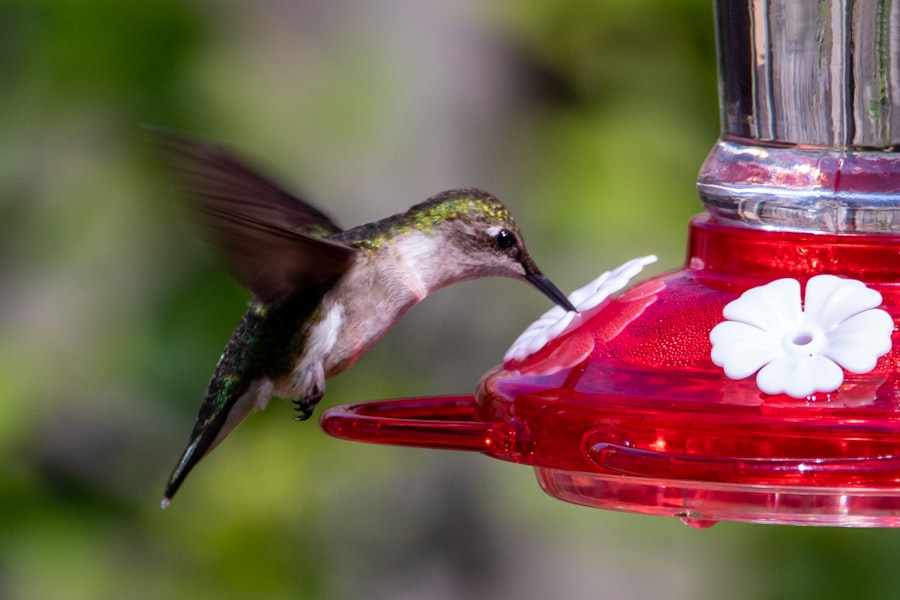
Maintaining the health of guinea fowl requires regular monitoring, preventative care, and prompt veterinary attention when necessary. It is important to observe the behavior and appearance of guinea fowl on a daily basis to detect any signs of illness or injury. Common signs of illness in guinea fowl include lethargy, decreased appetite, abnormal droppings, respiratory issues, lameness, or changes in behavior. Prompt veterinary attention should be sought if any concerning symptoms are observed.
In addition to regular monitoring, preventative care measures such as vaccination, parasite control, and biosecurity protocols should be implemented to protect the health of guinea fowl. Vaccination against common poultry diseases such as Newcastle disease and infectious bronchitis can help prevent outbreaks within the flock. Regular deworming and parasite control measures should also be implemented to prevent infestations of internal and external parasites such as worms, mites, lice, and ticks. Biosecurity protocols such as quarantining new birds before introducing them to the flock can help prevent the spread of infectious diseases.
Overall, maintaining the health of guinea fowl requires regular monitoring, preventative care measures such as vaccination and parasite control, prompt veterinary attention when necessary, and biosecurity protocols to protect the health of the flock.
Conclusion and Final Considerations for Keeping Guinea Fowl as Pets
In conclusion, keeping guinea fowl as pets can be a rewarding experience that provides pest control benefits, flavorful meat, nutritious eggs, and unique companionship. However, it is important to carefully consider their space requirements, noise level, social needs, predator-proofing measures, housing requirements, diet and nutrition needs, health care requirements before bringing them into your home.
Guinea fowl require spacious outdoor enclosures with secure fencing and predator-proofing measures to ensure their safety. They also require sheltered areas such as coops or shelters where they can roost at night and seek refuge from inclement weather. Providing a balanced diet consisting of high-quality poultry feed, fresh water, and access to natural forage is essential for meeting their nutritional needs.
Maintaining the health of guinea fowl requires regular monitoring, preventative care measures such as vaccination and parasite control measures should be implemented to protect the health of guinea fowl.
Overall, keeping guinea fowl as pets requires careful consideration of their space requirements, noise level social needs predator-proofing measures housing requirements diet nutrition needs health care requirements before bringing them into your home. With proper care attention guinea fowl can thrive as pets providing pest control benefits flavorful meat nutritious eggs unique companionship for their owners.
If you’re considering keeping guinea fowl as pets, you may also be interested in learning about the benefits of an A-frame chicken coop. Check out this informative article on PoultryWizard about the advantages of using an A-frame design for your chicken coop here. It’s a great resource for anyone looking to create a comfortable and practical living space for their feathered friends.
FAQs
What are guinea fowl?
Guinea fowl are a type of bird that are native to Africa. They are known for their distinctive appearance, with speckled feathers and a helmet-like crest on their heads.
Can guinea fowl be kept as pets?
Yes, guinea fowl can be kept as pets. They are often kept for their pest control abilities, as they eat insects and ticks. They can also be kept for their unique appearance and entertaining behavior.
What do guinea fowl eat?
Guinea fowl are omnivores and eat a variety of foods including insects, seeds, grains, and small fruits. They can also be given commercial poultry feed.
Do guinea fowl require special housing?
Guinea fowl require a secure coop or housing to protect them from predators. They also need access to a large outdoor area to roam and forage.
Are guinea fowl noisy?
Yes, guinea fowl are known for being noisy birds. They have a loud, distinctive call that can be heard from a distance.
Do guinea fowl need companions?
Guinea fowl are social birds and do best when kept in small flocks. They can be kept with other guinea fowl or with other poultry species.
Are guinea fowl easy to care for?
Guinea fowl require some special care, particularly in terms of predator protection and providing a suitable outdoor environment. However, they are generally hardy birds and can adapt to a variety of climates.
Meet Walter, the feathered-friend fanatic of Florida! Nestled in the sunshine state, Walter struts through life with his feathered companions, clucking his way to happiness. With a coop that’s fancier than a five-star hotel, he’s the Don Juan of the chicken world. When he’s not teaching his hens to do the cha-cha, you’ll find him in a heated debate with his prized rooster, Sir Clucks-a-Lot. Walter’s poultry passion is no yolk; he’s the sunny-side-up guy you never knew you needed in your flock of friends!

